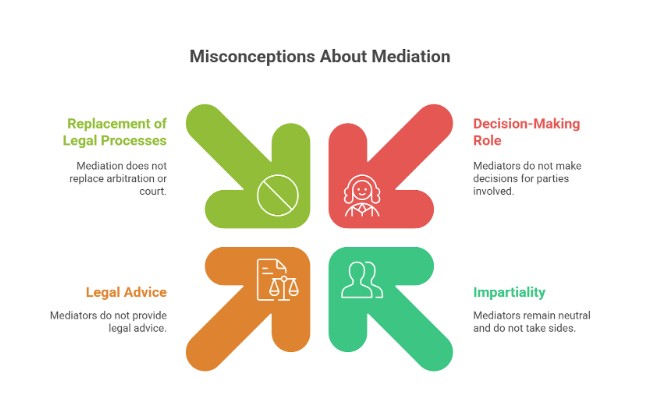
Getting divorced in New Jersey can feel overwhelming, especially when you have no idea what to expect.
Maybe you’ve heard about divorce mediation, but you’re not really sure what it actually involves—or if a mediator could help in your situation.
A mediator guides structured negotiation between spouses, clarifies issues, manages the process, helps generate settlement options, and drafts agreement language — but does not represent either side or issue court orders.
Unlike a judge, who makes decisions for you, a mediator guides the conversation so both spouses can reach their own agreements.
This approach usually costs less and creates less conflict than traditional divorce litigation. Divorce mediation in New Jersey has become increasingly popular, mainly because it gives couples more control over the process.
Understanding what mediators actually do during sessions can help you determine if this path is suitable for your situation.
Key Takeaways
- Mediators help spouses communicate and reach divorce agreements without court battles.
- The mediation process involves structured sessions where couples negotiate issues related to custody, property, and support.
- Mediation is most effective when both parties can communicate openly and are willing to avoid lengthy court proceedings.
What Does a Mediator Do in a Divorce?

A divorce mediator is a neutral third party who helps couples work through their separation outside of court.
Divorce mediation is a collaborative process that lets divorcing spouses control the timing and outcome of their case.
The mediator doesn’t make decisions for the couple. They facilitate communication and help negotiate agreements on disputed issues.
Key Responsibilities of a Divorce Mediator:
- Guide discussions about child custody and support
- Help divide property and debts fairly
- Assist with spousal support decisions
- Facilitate communication between spouses
- Draft agreements based on decisions made
Alternative dispute resolution through mediation keeps couples out of contentious courtroom battles. The process is voluntary and confidential.
Mediators work in a completely neutral capacity. They can’t favor one spouse or give legal advice to either party.
The mediator’s primary role is to assist spouses in reaching mutually acceptable agreements on all aspects of their divorce, including financial matters and parenting arrangements.
Divorce mediation allows couples to maintain control over their divorce outcome. It often costs less and proceeds more quickly than traditional court proceedings.
Sessions can last a few hours or span several days, depending on the complexity of the issues.
The Mediation Process: Step-By-Step (What Happens in a Session)
The divorce mediation process consists of three main phases that guide divorcing spouses from the initial paperwork through to final settlement agreements.
Each phase addresses specific aspects of divorce, including financial disclosure and drafting custody and support arrangements.
Intake: Paperwork, Financial Disclosure List
The mediation process begins with comprehensive intake paperwork that divorcing spouses fill out before their first session.
Both parties provide detailed financial information, including income statements, tax returns, bank account records, and asset documentation.
The mediator asks for specific forms for different divorce issues:
- Child custody matters: Parenting time schedules, school records, healthcare information
- Child support calculations: Pay stubs, benefits documentation, childcare costs
- Spousal support evaluation: Career history, educational background, health records
- Asset division: Property deeds, retirement account statements, business valuations
This financial disclosure list ensures transparency between divorcing spouses. The mediator uses this information to ensure discussions about alimony, child support, and property division remain fair.
Most mediators send intake forms a week or two before the first session. If you fill out the paperwork completely and accurately, you’ll probably need fewer mediation sessions.
Sessions: How a Session Runs and Expected Length
Each mediation session follows a structured format where the mediator lays out ground rules and explains their neutral role.
The divorcing couple discusses specific issues, and the mediator guides the conversation, helping them find solutions.
Typical session structure:
- Opening statements from each spouse
- Issue identification and prioritization
- Guided discussion and negotiation
- Agreement documentation
Sessions usually last 1.5 to 2 hours. Most couples require 3-6 sessions to resolve their issues, but more complicated divorces may take longer.
The mediator addresses one topic at a time, like child custody or spousal support. They help spouses communicate and explore creative solutions that work for both parties.
Between sessions, couples often review proposed agreements and gather any additional financial documents as needed.
If you’re ready to get started, call us now!
Drafting: How and When the Mediator Drafts Settlement Language
The mediator drafts settlement language after the spouses reach an agreement on specific issues. They create written summaries that capture each decision about child custody, child support, alimony, and asset division.
Document timeline:
- Session notes: Made right after each meeting
- Partial agreements: Drafted when specific issues are resolved
- Final settlement: Completed when all divorce matters are decided
The mediator writes clear, specific language that everyone can understand. For example, custody agreements typically include specific pickup times, holiday schedules, and allocation of decision-making responsibilities.
Settlement documents outline the financial arrangements, including child support amounts, payment dates, and duration.
Spousal support agreements typically include monthly payments, conditions for modification, and details regarding the duration of support.
Once both spouses approve the final draft, they typically submit the mediated agreement to their attorneys for legal review before filing it with the court.
What the Mediator Actually Does?
A neutral third-party mediator helps divorcing couples negotiate through specific tasks during the process.
The mediator begins by gathering basic information about the marriage and the issues that need to be resolved.
The mediator obtains a confidentiality agreement signed by both spouses to protect their interests. This fosters a safe space for open and honest discussion.
Key tasks include:
- Setting the agenda for each session
- Facilitating joint discussions between spouses
- Conducting private meetings with each party
- Helping couples negotiate fair solutions
- Identifying areas of agreement and disagreement
The mediator remains impartial throughout the process. They don’t take sides or make decisions on behalf of the couple.
Communication support is a huge part of the job. The mediator helps spouses discuss complex topics, such as property division, child custody, and support payments.
When agreements are reached, the mediator drafts a Memorandum of Understanding. This document records all decisions made during the mediation process.
The mediator may also file the final divorce settlement agreement with the court. This converts the mediated agreement into a legally binding document that both parties must adhere to.
What a Mediator Does Not Do (Common Misconceptions)

People often have misconceptions about what mediators do during divorce. Understanding these common misconceptions about divorce mediation helps couples know what to expect.
Does Not Make Decisions
Mediators cannot tell parents what to do or force them to agree. They guide discussions but don’t impose solutions, unlike judges in litigation.
Does Not Take Sides
Mediators don’t take sides during the process. They stay neutral and can’t argue for either spouse.
Does Not Provide Legal Advice
Mediators aren’t lawyers for either party. They cannot provide legal advice on rights or recommend specific legal strategies.
Does Not Replace Arbitration or Court
Mediation isn’t the same as arbitration. In arbitration, the arbitrator makes binding decisions. Mediators only help couples reach their own agreements.
Common Myths:
- Myth: Mediators decide who gets what
- Reality: Couples make all final decisions
- Myth: Mediators give legal guidance
- Reality: They facilitate communication only
- Myth: Mediation works like litigation
- Reality: No binding rulings are made
The mediator’s primary role is to ensure that communication flows smoothly. They can’t force outcomes or promise that you’ll reach an agreement, but they sure do their best to help you get there.
Confidentiality & Documentation: What Stays Private and What Becomes Enforceable
Confidentiality sits at the heart of mediation sessions and shields couples during divorce. Whatever gets discussed in mediation stays private and can’t be used in court later.
What Remains Confidential:
- All verbal discussions between spouses
- Financial disclosures shared during sessions
- Personal concerns about children or property
- Failed negotiation attempts
The mediator can’t be called to testify about what happened during sessions. That protection encourages honest communication between divorcing couples—sometimes, that’s the only way they really open up.
What Becomes Enforceable:
Only the final written agreement carries legal weight. The memorandum of understanding outlines all the decisions made during mediation and becomes binding upon signature.
| Private Information | Enforceable Documents |
| Session discussions | Memorandum of understanding |
| Negotiation attempts | Final settlement agreement |
| Personal statements | Court-filed documents |
The memorandum of understanding lists specific terms about property, custody, and support payments. Once both spouses have signed, it becomes legally binding.
Courts enforce the memorandum just as they would any contract. But they can’t access the private conversations that led to it, and that’s by design.
Coastal Business Services — get a mediation process consultation for divorce mediation to learn the timeline and fees, plus a written estimate and next steps. Contact us to schedule.
If you’re ready to get started, call us now!
When Mediators Use Experts (And Who Pays)
Sometimes divorce mediators need outside experts. This happens when couples have complex financial issues or unusual assets.
Common Expert Types:
- Appraisers for real estate or businesses
- Accountants for tax matters
- Financial planners for retirement accounts
- Child specialists for custody issues
Mediators bring in experts during economic mediation if couples own businesses, investment properties, or tangled retirement plans.
Who Covers Expert Costs:
The mediator fees usually get split 50/50. Expert costs typically follow the same rule.
Each expert charges their own way—some by the hour, while others charge a flat rate. Mediators clearly explain these costs upfront, ensuring there are no surprises.
Payment Examples:
- Real estate appraiser: $300-800 (split between spouses)
- Business valuation expert: $2,000-5,000 (divided equally)
- Child psychologist: $150-300 per hour (shared cost)
Couples have to agree before hiring experts. Both spouses sign off on the expense and payment method.
The mediator coordinates with experts but stays neutral. They don’t pick sides or favor one spouse’s preferred expert.
Expert reports help mediators guide discussions. Neutral info makes it easier for couples to reach fair agreements on tough topics.
Private Mediation vs Court-Connected Mediation in NJ
New Jersey offers two main types of divorce mediation. Each one serves different needs for divorcing couples.
Court-connected mediation is mandatory for divorces involving children in New Jersey. The court assigns a mediator to help resolve disputes regarding custody and parenting time.
This type happens after couples file for divorce. Courts require it when child custody issues need to be resolved.
Private Mediation is voluntary and flexible. Couples get to choose their mediator and control the timing of sessions.
| Court-Connected | Private |
| The court assigns a mediator | Couples choose a mediator |
| Required for child cases | Completely voluntary |
| Limited to custody issues | Covers all divorce topics |
| Follows the court schedule | Flexible timing |
Private mediation allows couples to address all divorce-related issues, including finances and property. Court-connected mediation sticks to child-related matters.
Both types keep things confidential. Either can include attorneys if needed.
Private mediation gives couples more control over the process. They can start before filing for divorce or use it for separation agreements.
Court-ordered mediation is available in every New Jersey county when custody disputes arise.
How to Prepare for Mediation (Practical Checklist)
Effective mediation preparation helps couples achieve better outcomes. Planning makes sessions more productive and less stressful.
Financial Documents to Gather:
- Bank statements (last 3-6 months)
- Tax returns (last 2-3 years)
- Pay stubs and employment records
- Retirement account statements
- Investment portfolios
- Debt statements and credit reports
Property and Asset Lists:
- Real estate documents
- Vehicle titles and loan information
- Personal property inventory
- Business ownership records
Couples should determine their wants versus their needs before mediation. Needs are non-negotiable, like child safety or basic living expenses. Wants are preferred outcomes that might be open to compromise.
Mental and Emotional Preparation:
It’s wise to consider your priorities ahead of time. Writing down concerns and questions helps keep thoughts organized during emotional talks.
Communication Goals:
Plan to listen actively and speak respectfully. The mediator guides discussions but can’t force agreements.
Childcare Arrangements:
Parents need to consider school schedules, activities, and holidays when talking about custody. Having specific dates and times ready speeds things up.
Mediators typically provide document checklists before the first session. Sticking to these lists means you won’t have to scramble for information later.
Questions to Ask a Mediator Before Hiring
Choosing the right mediator really matters for a smooth divorce. Couples should come prepared with specific questions to size up potential mediators.
Experience and Background: Ask about the mediator’s experience with divorce cases. Not all mediators specialize in the same types of disputes, so understanding their background is helpful.
Find out how many divorce cases they’ve handled. Ask about their training and certifications in family mediation.
Mediation Style and Process: Ask about their mediation style. Some mediators are more hands-on, others stay in the background.
Observe how they handle high-conflict situations. A skilled mediator should have conflict resolution tools for tense moments.
Key Questions to Consider:
- What is your fee structure and payment schedule?
- How do you ensure confidentiality during sessions?
- How long does the typical divorce mediation take?
- What happens if mediation doesn’t work?
- Do you provide written agreements at the end?
Practical Considerations: Ask about session length and scheduling. Find out if they offer virtual or in-person sessions.
See if they’re comfortable handling complex financial matters or child custody issues. Some mediators specialize in specific areas of family law.
Outcomes: What to Expect After Successful Mediation
When couples agree through mediation, they create a comprehensive divorce settlement. This agreement covers all the significant issues in their marriage.
The mediator writes down every decision. That becomes the foundation for the final divorce papers.
Key elements usually included:
- Property division details
- Child custody arrangements
- Spousal support terms
- Child support amounts
After receiving documents from the divorce mediator, couples still have a few steps left. The mediation agreement isn’t legally binding until it’s filed with the court.
An attorney reviews the settlement terms. They ensure that everything meets the requirements of New Jersey divorce law.
The agreement gets included in official court documents. These papers go to the family court for approval.
Timeline after mediation:
| Step | Typical Duration |
| Document preparation | 1-2 weeks |
| Court filing | 1-3 days |
| Judge review | 2-4 weeks |
Once approved, the divorce is final. The post-mediation steps help minimize future disputes between former spouses.
Both parties get certified copies of their divorce decree. That document proves the marriage is legally over.
The entire process, from completing mediation to obtaining the final decree, typically takes 30 to 60 days in New Jersey. That’s assuming there are no complications or contested issues during the court review.
Red Flags Where Mediation Is Unsafe or Inappropriate
Sometimes, divorce mediation is not a safe or realistic option. It’s smart to spot these red flags before you get too far down the road.
Domestic Violence History Mediation is not recommended when domestic violence exists. Power imbalances can make real negotiation impossible. Victims might feel trapped into saying yes to unfair terms.
Major Trust Issues: When someone hides assets or lies about their finances, mediation often falls apart. You really need a foundation of trust to discuss finances openly and honestly.
High-Conflict Situations: Complex financial matters and high levels of conflict often render mediation an unsuitable option. If you two can’t get through a conversation without it blowing up, the court might be the only way.
Power Imbalances: Big gaps in education, income, or confidence can tilt the whole process. Sometimes, one person just steamrolls the other, and that’s not fair.
Substance Abuse Problems. Active addiction makes clear thinking tough. If someone’s judgment is off, the agreements can end up way out of balance.
Mental Health Crises Severe depression, anxiety, or untreated mental health struggles get in the way. It’s better to seek help first before attempting to make significant life changes.
Complex Asset Division: Business ownership, multiple homes, or tangled investments? Complex financial matters often exceed the scope of mediation. Sometimes, you just need a lawyer to sort it out.
Final Thoughts
Divorce mediation gives New Jersey couples a practical way forward. It usually costs less than a court fight and allows you to maintain control over the outcome.
Many couples appreciate the collaborative approach of mediation. If you both want to skip the courtroom drama, it’s often a good fit.
When Mediation Makes Sense
- Both spouses can communicate, at least reasonably well
- No one’s hiding money or income
- There’s no domestic violence in the picture
- You want to shield your kids from as much conflict as possible
But if your spouse just won’t cooperate, traditional divorce might be the only way. Sometimes, you really need a judge to step in.
Request a written mediation agreement review and clear cost breakdown to avoid surprises; get a step-by-step plan and conservative budget. Contact us to schedule with Coastal Business Services.
If you’re ready to get started, call us now!
Frequently Asked Questions
What does a divorce mediator do?
A mediator is a neutral facilitator who organizes discussions, clarifies issues, proposes tradeoffs, and helps both spouses draft a written settlement — they do not represent either party or issue court orders.
How does the mediation process work?
Typical steps: intake and paperwork → issue listing and disclosure → joint and/or private sessions → negotiation and tradeoffs → draft Marital Settlement Agreement (MSA) → attorney review and court filing if parties agree.
How long does divorce mediation usually take?
Many straightforward cases are resolved in 4–8 sessions (approximately 8–12 hours) over a period of weeks to a few months; complex custody or financial cases often require 15–25 hours and a longer timeline.
How do mediators charge, and what does it cost in NJ?
Private mediators typically charge $250–$500 per hour; many cases total $2,000–$8,000 for standard mediation. Court-connected or reduced-fee programs may be more affordable.
What additional fees should I budget for?
Include administrative/filing fees ($200–$500), attorney review ($500–$1,500), and any expert costs (valuations, parenting specialists), which can add several thousand, depending on the scope.
Are mediation agreements legally binding in NJ?
Yes — once parties sign an MSA and the court enters it as the final judgment, the settlement is enforceable. Mediation discussions themselves are generally confidential, but the filed judgment is not.
Are mediation conversations confidential?
Yes — mediation communications are generally confidential in New Jersey, with important exceptions (e.g., threats of harm, child abuse, fraud). The final signed agreement becomes part of the public court record if filed.
When is mediation NOT appropriate? (red flags)
Mediation is unsafe or ineffective with a history of domestic violence, active coercion, severe substance abuse, or untreated mental-health crises, significant hidden assets, extreme power imbalances, or when one party refuses to negotiate.
Can I bring an attorney to mediation?
Yes — you can bring counsel to sessions or hire limited-scope attorneys for document review and advice; many couples use attorney review to protect legal rights while keeping mediation costs lower.
Do mediators use experts, and who pays?
Mediators can coordinate neutrals (forensic accountants, appraisers, parenting consultants). Parties typically agree to split expert fees or allocate them as part of the settlement plan, agreeing on the scope and caps upfront to control costs.





